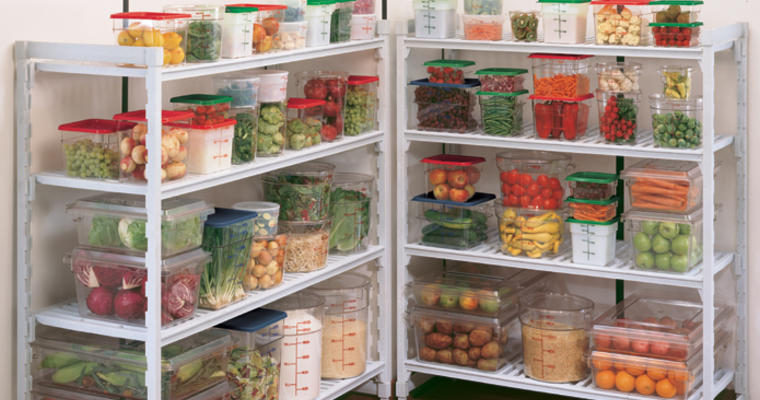Apples
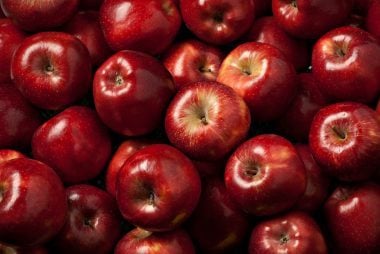 An apple a day might keep the doctor away, but not if it rots before you can enjoy it. Apples can be stored at room temperature, but if you want greater longevity, store your apples in the refrigerator, preferably in the crisper drawer. Leaving an apple out at room temperature will cause it to ripen after a few days, but popping it into the fridge will keep it crisp for weeks. Find out 12 things you can do with apples besides eat them.
An apple a day might keep the doctor away, but not if it rots before you can enjoy it. Apples can be stored at room temperature, but if you want greater longevity, store your apples in the refrigerator, preferably in the crisper drawer. Leaving an apple out at room temperature will cause it to ripen after a few days, but popping it into the fridge will keep it crisp for weeks. Find out 12 things you can do with apples besides eat them.
Flour
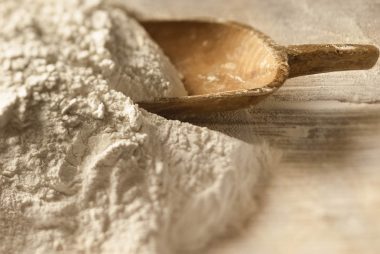 Flour will stay fresh and usable if it’s placed in an airtight metal, glass, or plastic container, rather than leaving it in the paper bag packaging from the store. Flour takes a longer time to go bad compared to most foods, but the process will still move faster if it isn’t protected. Whole grain flours are particularly sensitive. You might want to consider storing whole grain flour in the refrigerator or freezer to slow down the oxidation process further.
Flour will stay fresh and usable if it’s placed in an airtight metal, glass, or plastic container, rather than leaving it in the paper bag packaging from the store. Flour takes a longer time to go bad compared to most foods, but the process will still move faster if it isn’t protected. Whole grain flours are particularly sensitive. You might want to consider storing whole grain flour in the refrigerator or freezer to slow down the oxidation process further.
Fruit
 Many people store fruit in the refrigerator—and with apples and some sensitive fruits like raspberries, that may be a good plan, but other fruit needs to ripen on the counter before going in the fridge with other foods. Fruit also should not be stored with vegetables because they can cause each other to deteriorate faster because of the different gases they emit. Separation here is key. Find out about more fresh foods you should never store together.
Many people store fruit in the refrigerator—and with apples and some sensitive fruits like raspberries, that may be a good plan, but other fruit needs to ripen on the counter before going in the fridge with other foods. Fruit also should not be stored with vegetables because they can cause each other to deteriorate faster because of the different gases they emit. Separation here is key. Find out about more fresh foods you should never store together.
Content continues below ad
Potatoes
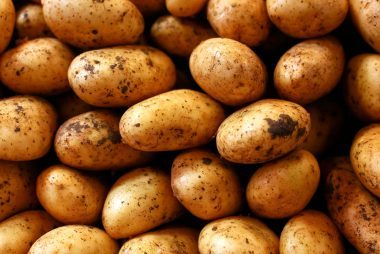 Potatoes need to be kept in a dry, cool, and dark place in order to stay fresh. Potatoes do not do well in the refrigerator, though, as temperatures that are too cold (below 50 degrees) will cause the starch in the potato to convert to sugar. That conversion will make the potatoes taste overly sweet, and will discolor them too. Potatoes are also one of the foods you should never put in a blender.
Potatoes need to be kept in a dry, cool, and dark place in order to stay fresh. Potatoes do not do well in the refrigerator, though, as temperatures that are too cold (below 50 degrees) will cause the starch in the potato to convert to sugar. That conversion will make the potatoes taste overly sweet, and will discolor them too. Potatoes are also one of the foods you should never put in a blender.
Onions
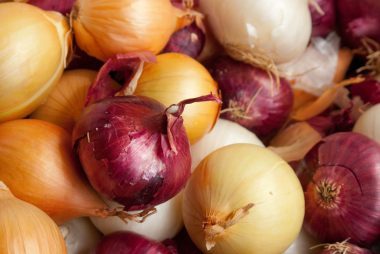 Like potatoes, onions can be a little sensitive. They need to be stored in dry, dark, cool places, but they also need reasonable air circulation to stay fresh. On top of this, they should not be stored near potatoes, even though both foods need to be stored in similar conditions. Onions and potatoes bring out moisture and gasses in each other, causing them both to ripen faster. Refrigeration is a good choice to keep onions fresh. (Bonus: You’ll also tear less when you chop them!)
Like potatoes, onions can be a little sensitive. They need to be stored in dry, dark, cool places, but they also need reasonable air circulation to stay fresh. On top of this, they should not be stored near potatoes, even though both foods need to be stored in similar conditions. Onions and potatoes bring out moisture and gasses in each other, causing them both to ripen faster. Refrigeration is a good choice to keep onions fresh. (Bonus: You’ll also tear less when you chop them!)
Fresh meat
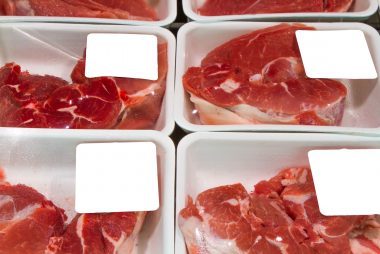 If you’ve purchased fresh meat from the store, feel free to keep it in its store wrapping and follow instructions as given. Re-wrapping and storing meat actually increases the risk of exposing it to bacteria along the way, so it’s best to trust the packaging on this one. If your meat didn’t come with a tray under it, though, put a plate underneath the package to catch any excess moisture.
If you’ve purchased fresh meat from the store, feel free to keep it in its store wrapping and follow instructions as given. Re-wrapping and storing meat actually increases the risk of exposing it to bacteria along the way, so it’s best to trust the packaging on this one. If your meat didn’t come with a tray under it, though, put a plate underneath the package to catch any excess moisture.
Content continues below ad
Lettuce
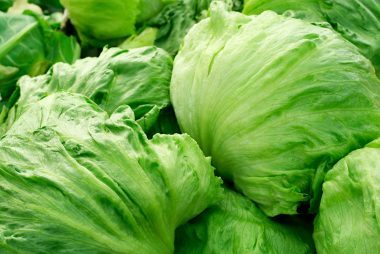 When lettuce goes bad, it gets slimy, which is wasteful, not to mention gross. To avoid this, do not put your lettuce in a plastic bag. Lettuce needs to be in a perforated bag, or washed and stored in a bowl in the refrigerator or in a paper bag (only once it’s completely dry). Even though you see supermarkets spraying their lettuces, the moisture actually ages them faster. Check out more veggie and fruit tips from Produce Pete, the kitchen commando.
When lettuce goes bad, it gets slimy, which is wasteful, not to mention gross. To avoid this, do not put your lettuce in a plastic bag. Lettuce needs to be in a perforated bag, or washed and stored in a bowl in the refrigerator or in a paper bag (only once it’s completely dry). Even though you see supermarkets spraying their lettuces, the moisture actually ages them faster. Check out more veggie and fruit tips from Produce Pete, the kitchen commando.
Cheese
 Hard cheeses, like parmigiano and aged cheddar, need special storage, and it’s not airtight Tupperware. Make sure your hard cheeses are stored in the store wrapping until you use them (don’t repackage), preferably in the cheese drawer of your fridge, where they’ll last six months, according to a report by Extension Food Safety Specialists at Oregon State University. (They’ll last up to eight months in the freezer but might get more crumbly.) Once you’ve broken them out, re-wrap them in foil, wax paper, or loose plastic when putting them back in the refrigerator.
Hard cheeses, like parmigiano and aged cheddar, need special storage, and it’s not airtight Tupperware. Make sure your hard cheeses are stored in the store wrapping until you use them (don’t repackage), preferably in the cheese drawer of your fridge, where they’ll last six months, according to a report by Extension Food Safety Specialists at Oregon State University. (They’ll last up to eight months in the freezer but might get more crumbly.) Once you’ve broken them out, re-wrap them in foil, wax paper, or loose plastic when putting them back in the refrigerator.
Uncooked pasta
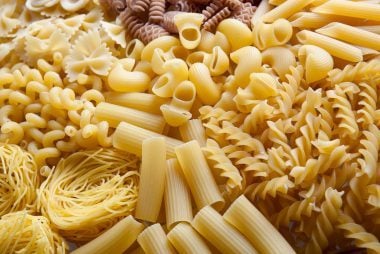 Despite popular belief, uncooked pasta should not be stored in its original container if you want it to last longer. Repackage uncooked pasta in an airtight glass container to extend its life and avoid the mustiness and moisture problems that sometimes occur over time with original cardboard packaging.
Despite popular belief, uncooked pasta should not be stored in its original container if you want it to last longer. Repackage uncooked pasta in an airtight glass container to extend its life and avoid the mustiness and moisture problems that sometimes occur over time with original cardboard packaging.
Content continues below ad
Tomatoes
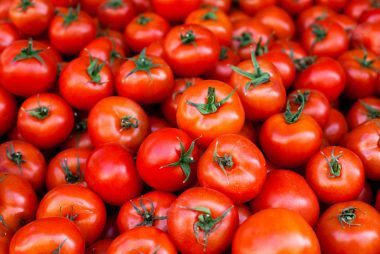 Tomatoes are another sensitive food that can be tricky to store. They should be left on a countertop, but away from light, moisture, and heat. They should not be stored in the refrigerator, or their cellular structure will start to collapse, which is what causes that mushy, mealy texture—and the flavor will be lost too. Tomatoes will ripen at room temperature and are good for two to three days once ripe. Do refrigerate them within two hours after they’ve been sliced or chopped, advises the Oregon State University report. These are 10 of the healthiest vegetables you can eat.
Tomatoes are another sensitive food that can be tricky to store. They should be left on a countertop, but away from light, moisture, and heat. They should not be stored in the refrigerator, or their cellular structure will start to collapse, which is what causes that mushy, mealy texture—and the flavor will be lost too. Tomatoes will ripen at room temperature and are good for two to three days once ripe. Do refrigerate them within two hours after they’ve been sliced or chopped, advises the Oregon State University report. These are 10 of the healthiest vegetables you can eat.
Bread
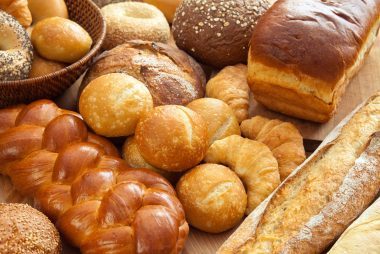 Bread can be stored in the pantry, but it will last much longer when it’s stored in the refrigerator or freezer. Fresh bread can get moldy quickly, so utilizing the cold storage areas of your house can help extend its shelf life substantially, though it may get stale faster, according to the Oregon State University report. (Pop it in the oven or toaster to restore crispness). Bread is fine to use in a toaster oven directly from a freezer without any risk of sogginess. Storing bread for longer also helps you get more resistant starch in your diet, which is the “good carb” you need to eat more.
Bread can be stored in the pantry, but it will last much longer when it’s stored in the refrigerator or freezer. Fresh bread can get moldy quickly, so utilizing the cold storage areas of your house can help extend its shelf life substantially, though it may get stale faster, according to the Oregon State University report. (Pop it in the oven or toaster to restore crispness). Bread is fine to use in a toaster oven directly from a freezer without any risk of sogginess. Storing bread for longer also helps you get more resistant starch in your diet, which is the “good carb” you need to eat more.
Content continues below ad

